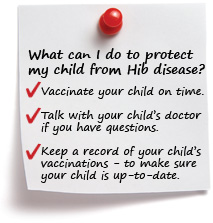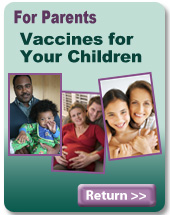Hib - Fact Sheet for Parents
Diseases and the Vaccines that Prevent Them
Español: Enfermedad por Hib
Printer friendly version[399 KB, 2 pages]
Benefits of Hib vaccine
- Saves lives.
- Protects young children from serious disease and lifelong disability.
- Keeps others safe.
Side effects of the Hib vaccine
The most common side effects are usually mild and last 2 or 3 days. They include the following:
- Redness, swelling, and warmth where the shot was given in 1 out of 4 children.
- Fever over 101 degrees in 1 out of 20 children.
What is Hib disease?
Hib disease is a serious illness caused by the bacteria Haemophilus influenzae type b. Babies and children younger than 5 years old are most at risk for Hib disease. It can cause lifelong disability and be deadly. The Hib vaccine prevents Hib disease.
What are the symptoms of Hib disease?
Hib disease causes different symptoms depending on which part of the body it affects.
The most common type of Hib disease is meningitis. This is an infection of the covering of the brain and spinal cord. It causes the following:
- Fever
- Loss of alertness
- Stiff neck
Hib disease can also cause the following:
- Throat swelling that makes it hard to breathe
- Joint infection
- Skin infection
- Pneumonia (lung infection)
- Bone infection
How serious is Hib disease?
Hib disease is very dangerous. Most children with Hib disease need care in the hospital. Even with treatment, as many as 1 out of 20 children with Hib meningitis dies.
As many as 1 out of 5 children who survive Hib meningitis will have brain damage or become deaf.
How does Hib disease spread?
Hib spreads when an infected person coughs or sneezes. Usually, the Hib bacteria stay in a person’s nose and throat and do not cause illness. But if the bacteria spread into the lungs or blood, the person will get very sick.
Spread of Hib is common among family members and in child care centers.
What is the Hib vaccine?
The Hib vaccine is a shot that protects against Hib disease. The vaccine protects children by preparing their bodies to fight the bacteria.
Almost all children (at least 95 children out of 100) who get all doses of the vaccine will be protected from Hib disease.
Why should my child get the Hib vaccine?
Getting your child the Hib vaccine protects him against serious, and even deadly, illness. It is rare for a child who has had the Hib vaccine to get Hib disease.
When should my child get the Hib vaccine?
Children should get three or four doses of the Hib vaccine at the following ages for best protection:
- One dose at 2 months;
- A second dose at 4 months;
- For some brands, one dose at 6 months; and
- A final dose at 12 through 15 months of age.
It is safe to get the Hib vaccine at the same time as other vaccines, even for babies.
Is the Hib vaccine safe?
The Hib vaccine is very safe, and it is effective at preventing Hib disease. Vaccines, like any medicine, can have side effects. But severe side effects from the Hib vaccine are very rare.
 If my child does not get the Hib vaccine, will he get the Hib disease?
If my child does not get the Hib vaccine, will he get the Hib disease?
Without the vaccine, your child has a much greater chance of getting Hib disease. Most cases of Hib disease in the U.S. today are in children who have not had the Hib vaccine.
Before the Hib vaccine, Hib disease was the most common cause of meningitis in children younger than 5 years in the U.S. About 20,000 children got severe Hib disease each year, and about1,000 died.
Today, with the vaccine, cases of severe Hib disease have dropped by more than 99%. Many more children would get sick from Hib if people stopped vaccinating.
Where can I learn more about the Hib vaccine?
To learn more about the Hib vaccine or other vaccines, talk to your child’s doctor.
Call 800-CDC-INFO (800-232-4636) or go to the CDC Vaccines web site and check out the following resources:
- Is Your Child Protected Against Hib Disease?
- Common Questions Parents Ask about Infant Immunizations
- Vaccines website for parents
Fact Sheets for Parents
Diseases and the Vaccines that Prevent Them
![]() This symbol means you are leaving the CDC.gov Web site. For more information, please see CDC's Exit Notification and Disclaimer policy.
This symbol means you are leaving the CDC.gov Web site. For more information, please see CDC's Exit Notification and Disclaimer policy.
Copyrighted images: Images on this website which are copyrighted were used with permission of the copyright holder and are not in the public domain. CDC has licensed these images for use in the materials provided on this website, and the materials in the form presented on this website may be used without seeking further permission. Any other use of copyrighted images requires permission from the copyright holder.
Contact Us:
- Centers for Disease Control and Prevention
1600 Clifton Rd
Atlanta, GA 30333 - 800-CDC-INFO
(800-232-4636)
TTY: (888) 232-6348 - New Hours of Operation
8am-8pm ET/Monday-Friday
Closed Holidays - cdcinfo@cdc.gov




